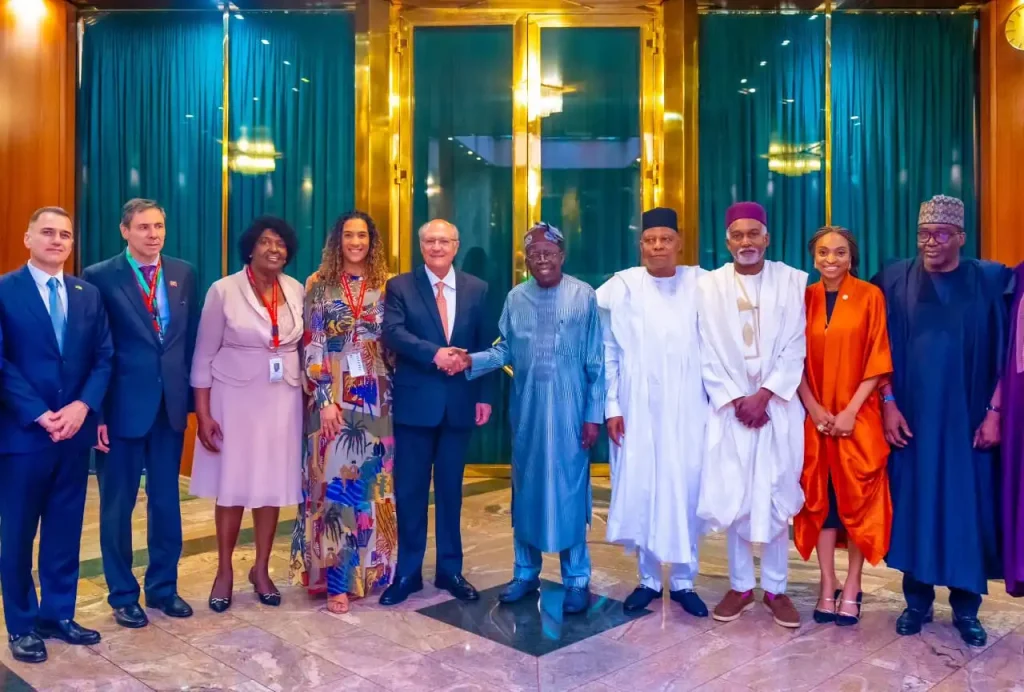Nigeria and Brazil signed a $1 billion agreement on Tuesday, June 24, 2025, to revolutionize agriculture, food security, energy, and defense in Nigeria, Vice President Kashim Shettima announced.
The deal, formalized during a visit by Brazilian Vice President Geraldo Alckmin to Abuja, aims to deploy over $1 billion in mechanized farming equipment, training, and service centers across Nigeria.
This marks a significant step toward modernizing the West African nation’s economy.
Nigeria, Africa’s most populous country with over 200 million people, relies heavily on subsistence farming and food imports due to fragmented land ownership by families and individuals, which complicates large-scale agriculture.
The agreement therefore seeks to shift this paradigm.
“We are moving from subsistence to scale in agriculture, and in energy, we are taking long-overdue steps to attract serious investment into gas production, refining, and renewables,” Shettima said.
The initiative, dubbed the Green Imperative Programme, is expected to create jobs and enhance food security through advanced farming techniques.
A Strategic Partnership
The deal builds on Nigeria’s economic reforms under President Bola Ahmed Tinubu, who targets a $1 trillion economy by 2030.
Shettima emphasized that reforms in agriculture, energy, education, and public finance, alongside bank recapitalization, are attracting foreign investment.
Brazil’s expertise in mechanized farming and renewable energy aligns with Nigeria’s goals, offering training and equipment to boost productivity.
The agreement also strengthens defense ties, though specifics remain undisclosed, signaling a broader strategic alliance.
Brazil’s investment includes plans for a gold refinery, hydrocarbon processing, and cotton factories, per industry reports, diversifying Nigeria’s economic base.
The partnership follows a 2024 Memorandum of Understanding to enhance agribusiness across Nigeria’s 774 local government areas, laying the groundwork for this larger commitment.
Tinubu hailed the deal as a milestone in bilateral ties, noting its potential to modernize agriculture and deepen cooperation.
Economic and Global Context
Nigeria’s push for agricultural transformation comes amid challenges, including high food inflation and reliance on imports, which strain its economy.
The deal aligns with Tinubu’s Renewed Hope Agenda, showcased at the ECOWAS summit in Abuja, where regional trade was prioritized.
However, barriers like the UAE’s reported visa restrictions on Nigerians, requiring a $60,000 bank balance, highlight external trade hurdles that could impact investor confidence, as noted in Nigeria’s foreign policy discussions.
The Nigeria-Brazil agreement contrasts with global economic pressures, such as the dollar’s recent decline after the Israel-Iran ceasefire, which eased oil prices—a key factor for Nigeria’s energy sector.
By diversifying into renewables and agriculture, Nigeria aims to reduce oil dependency and build resilience.
Looking Ahead
As Nigeria embarks on this transformative partnership, challenges like land tenure and implementation loom.
Can the Green Imperative Programme deliver food security and economic growth, or will structural hurdles slow progress?
With Brazil’s backing, Nigeria’s vision for a $1 trillion economy by 2030 is gaining momentum, but success hinges on execution and global cooperation.























